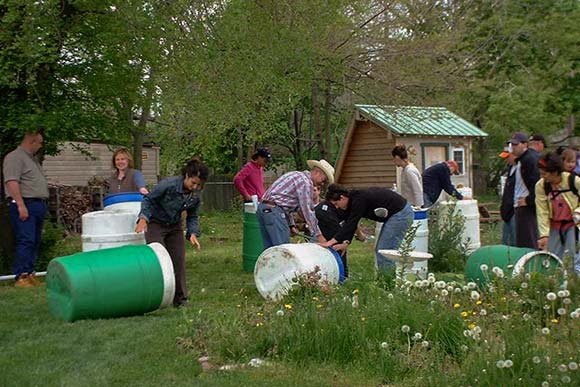Neighborhood Progress tackling climate resilience with grant money
 EcoVillage Rain Barrel Workshop
EcoVillage Rain Barrel Workshop
In a collaborative effort with the city of Cleveland's office of sustainability, four community development corporations and other groups, Cleveland Neighborhood Progress (CNP) is attempting to address the issues around climate resilience – the sustainability factors surrounding climate change.
Now, the organization will get additional help with its plans through a $660,000 grant over three years from the Kresge Foundation’s Climate Resilience and Urban Opportunity Initiative, which aims to improve the resilience of low-income communities in the face of climate change.
CNP will work with four neighborhoods – Glenville, Slavic Village, Central and Detroit Shoreway – that face a variety of sustainability issues. “We picked the four that best represented the range of typology related to the concentration of vacant land and related to economic diversity,” explains Linda Warren, CNP’s senior vice president of placemaking.
In lower income areas, heating and cooling costs during extreme temperatures put a financial burden on residents. Warren cites the Central neighborhood as a most fragile in terms of resilience, while the Detroit Shoreway is the least fragile of the four neighborhoods.
Warren explains that vacant land also translates into greater issues with heating and cooling in extreme temperature. “One of the issues in urban places is low tree canopy and high concentrations of heat island effect, making cities warmer than rural places and suburbs,” she explains. “Green space offsets that both by providing alternatives to concrete, which holds the heat, and as places to plant trees, which generate multiple benefits.”
In 2014 CNP received a planning grant from the Kresge Foundation. The plan identified projects, programs, policies, engagement strategies, and future research to lessen overall demand for energy, anticipate and prepare for climate changes and shocks, and foster social cohesion.
Cleveland was the only freshwater city of the 12 cities receiving money from Kresge’s $8 million pledge.
CNP will use the grant to hire 20 neighborhood climate ambassadors; advance climate adaptation strategies; build off of Cleveland’s weatherization and energy programs; and create strategies for the best possible usage of vacant land. The best practices identified will later be implemented in other neighborhoods.
CNP plans to implement its program in the beginning of the year. The group is now looking for ambassadors, who will get a small stipend for their work, and a climate resilience coordinator to lead the efforts.

